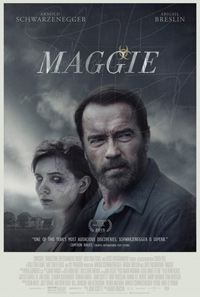The Big Z: Hobson’s Maudlin Debut Splices Tone Unevenly
 Pulled mysteriously from the Toronto Film Festival lineup last fall after it was picked up for distribution by Lionsgate, Henry Hobson’s zombie drama Maggie would go on to premiere at the Tribeca Film Fest shortly before its theatrical release. Basically a flashier version of the disease drama, Hobson uses the apocalyptic threat of a zombie pandemic as a genre injection. An allegory for every major disease, from cancer to Ebola or AIDs, the idea remains oddly innovative despite the lackluster execution. The juxtaposing elements of familial drama versus generic bits of genre tend to suck the life out of each another, making the film oddly misshapen. An aura of somnolence portends to haunt the proceedings, but the only thing that actually feels infected with anything is the film’s lethargic energy.
Pulled mysteriously from the Toronto Film Festival lineup last fall after it was picked up for distribution by Lionsgate, Henry Hobson’s zombie drama Maggie would go on to premiere at the Tribeca Film Fest shortly before its theatrical release. Basically a flashier version of the disease drama, Hobson uses the apocalyptic threat of a zombie pandemic as a genre injection. An allegory for every major disease, from cancer to Ebola or AIDs, the idea remains oddly innovative despite the lackluster execution. The juxtaposing elements of familial drama versus generic bits of genre tend to suck the life out of each another, making the film oddly misshapen. An aura of somnolence portends to haunt the proceedings, but the only thing that actually feels infected with anything is the film’s lethargic energy.
A necroambulist virus has decimated the human population, but several months after its initiation, scientists have developed a vaccine. However, there is nothing to be done with those that have already been infected. Recently bitten, Maggie (Abigail Breslin) flees, but is captured by authorities. The intervention of her father Wade (Arnold Schwarzenegger) means she can live her last six to eight weeks at their farm before being forced to enter the government quarantine zone, where patients go to die. Her stepmother (Joely Richardson) is leery of Wade’s insistence, sending their younger two children to live with an aunt. Meanwhile, Maggie reluctantly readies herself to say goodbye as the disease slowly takes over her being.
Think the zombie version of Still Alice, at least that’s how Maggie’s inevitable plight seems to play out as each passing day finds the young woman losing more and more of the life force that makes her unique. But Hobson’s attempt to remain serious and sincere, perhaps fearing that any break into visceral territory will disrupt our emotional investment, makes the film as brackish as Maggie’s decomposing visage.
Filmed in gloomy hues that are either desaturated or indicative of a constantly threatening climate, the palpable earnestness seems to cripple all aspects of the film. Despite committed performances from Breslin and Schwarzenegger, their relationship is related frustratingly. Wade had to pull some strings to allow Maggie to stay with her family in her last several weeks, yet they don’t seem to share that much screen time together. One conversation in particular seems to stand out, but the emotional distance of Joely Richardson’s stepmother Caroline isn’t explored beyond muted cliché (like when they share the film’s only moment of laughter bonding over her terrible cooking).
Another breakaway from the farm shows Maggie amidst peers, including an infected ex-boyfriend, and the sequence plays like an awkward mouthpiece of ideas refined solely for the parameters of Hobson’s narrative. Wade is filmed almost completely and frustratingly on the defensive about his daughter and Hobson takes a painstaking effort to show how humans override health protocol when it comes to family. And yet, this is exactly what doesn’t seem plausible in the wake of a pandemic.
Despite this, and the film’s heavily advising score, Maggie reaches a credible moment of brooding finesse in its final frames, culminating in a moment that may not be heartrending, but is assuredly and oddly touching.
★★½/☆☆☆☆☆


